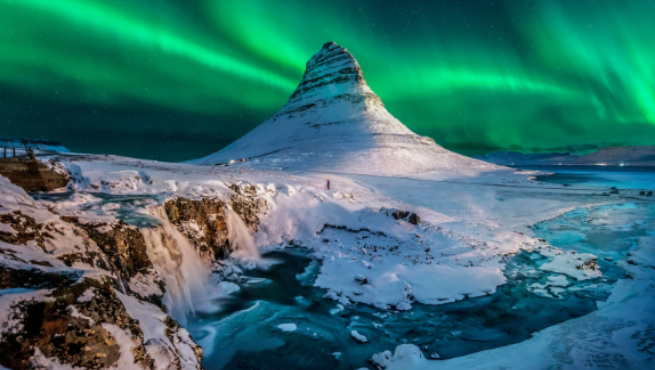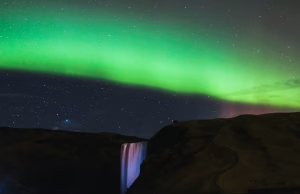Iceland’s otherworldly landscapes – thundering waterfalls, steaming geysers, and black sand beaches beckon adventurers from across the globe.
But before you pack your bags for this Nordic wonderland, you might wonder: Is Iceland safe to visit? The short answer is a resounding yes.
The short answer is a resounding yes. Iceland consistently ranks as one of the world’s safest countries thanks to its low crime rates, quality healthcare, and a strong sense of social responsibility.
Low Crime Rate in Iceland
One of the key factors that make Iceland an incredibly safe destination is its remarkably low crime rate.
According to the 2022 Global Peace Index, Iceland ranks as the most peaceful country in the world, a position it has held since 2008.
According to the Crime Index by Numbeo, Dubai scores really well relative to other cities on safety indexes:
|
Crime Index Score |
Safety Scale Rating |
|
25.7 (low: less incidence of crime) |
74.26 (high: greater level of safety) |
In comparison, London has a crime index score of 48.4! These numbers prove that Iceland is one of the safest countries in the world.
Safety Considerations for Iceland Travelers
While Iceland is undeniably safe, its unique landscape and weather conditions present some challenges that travelers should be aware of. Here are some key safety tips for travelers in Iceland:
Local Customs – Related Tips for Tourists Visiting Iceland
-
Icelanders tend to be friendly and informal, and greetings are usually casual. A simple “Hæ” (Hi) or “Góðan daginn” (Good day) is common.
-
Icelanders have a deep respect for nature and the environment. Always stay on marked paths when hiking or exploring the wilderness.
-
Tipping is not customary in Iceland, as service charges are typically included in the bill at restaurants and hotels.
-
If you plan on visiting Iceland’s public swimming pools, you must shower thoroughly before entering (without a swimsuit) to maintain hygiene. It’s a rule and an important custom in the country.
-
In the summer, Iceland experiences 24 hours of daylight due to the midnight sun. Be considerate of others if you’re out at night.
-
When viewing the Northern Lights, keep noise to a minimum to respect other people’s experience.
-
Public drinking is generally not allowed, and it’s advisable to enjoy drinks in private spaces like bars or homes.
-
Be mindful of local laws regarding alcohol: purchase it from licensed stores like Vínbúðin, which are the only places allowed to sell alcohol.

Traffic and Pedestrian-Related Tips for Iceland
Iceland has strict traffic regulations to ensure road safety, and tourists need to be aware of these rules when driving or walking around the country.
-
Iceland has very strict drunk driving laws. The legal blood alcohol concentration (BAC) limit is 0.02%, which is lower than in many other countries.
-
Urban Areas: The speed limit in cities and towns is generally 50 km/h (31 mph).
-
Rural Roads: On open rural roads, the speed limit is typically 90 km/h (56 mph).
-
Gravel Roads: In areas with gravel roads (common in rural regions), the speed limit drops to 80 km/h (50 mph).
-
Snow, ice, and high winds can cause hazardous driving conditions. Make sure to check the weather forecast and road conditions before heading out.
-
F-roads are highland roads that require 4×4 vehicles. These roads are only open in summer (usually June to September), and it’s illegal to drive on them with a regular car.
-
Icelandic drivers generally give priority to pedestrians at crosswalks, but you should still wait for the signal and make sure vehicles are stopping before crossing.
-
Always use designated sidewalks when walking in urban areas.
-
Off-road driving is strictly prohibited in Iceland to protect its fragile landscape. You could face heavy fines if caught driving off marked roads or trails.
Weather-Related Tips for Travelers
-
Always wear layers so you can adjust your clothing depending on the temperature.
-
Start with moisture-wicking base layers, add insulating layers, and top off with a waterproof, windproof outer layer to stay comfortable in varying conditions.
-
Use local weather apps or websites to check the forecast throughout the day. Keep an eye out for changes, particularly if you’re heading into outdoor activities like hiking, biking
-
Drink plenty of water, even if you don’t feel thirsty. Avoid alcohol and caffeine, which can dehydrate you, and opt for electrolyte drinks.
-
Wear sunscreen with a high SPF (at least 30), and reapply every 2 hours, especially after swimming or sweating.
-
Wear protective clothing, sunglasses, and a hat to shield yourself from the sun.

Women’s Safety in Iceland
Iceland is often ranked as one of the safest countries in the world for women, with a strong commitment to gender equality and personal safety.
-
Iceland has a high representation of women in law enforcement, with women making up about 30-35% of police officers in the country, which is higher than the global average.
-
112 is the emergency number for all types of emergencies in Iceland, including situations of domestic violence, assault, or other urgent issues.
-
Iceland has extensive CCTV coverage in major cities like Reykjavik, particularly in areas with high tourist traffic, to enhance public safety.
-
However, Iceland’s public surveillance system is generally used for security and traffic monitoring, and privacy laws ensure the protection of personal data.
-
Public transportation in Iceland is generally very safe for women. Reykjavik has an efficient bus system with night buses running on weekends.
-
Iceland has strict anti-sexual harassment laws and strong public policies to address harassment in the workplace and public spaces.
Common Scams to Avoid in Iceland
Iceland is known for being a safe destination with a very low crime rate, but like any popular tourist location, there are still some scams that visitors should watch out for.
-
Overpriced Tours and Activities: Some unlicensed tour operators may approach tourists, especially in popular areas like Reykjavik or near Golden Circle sites, offering tours at inflated prices or without proper credentials.
- How to Avoid: Always book tours through official agencies or reputable companies that have good reviews.
-
Fake Taxi Drivers: There have been instances where unlicensed taxis, often found outside airports or hotels, overcharge tourists for rides.
- How to Avoid: Always use official taxi services, such as those called via app or found at official taxi stands like Uber.
-
Currency Exchange Scams: Some exchange booths, especially in high-tourist areas, may offer very poor exchange rates or hidden fees.
- How to Avoid: Use ATMs or exchange money at bank offices rather than currency exchange booths.
-
Free Gift or Souvenir Scams: You might encounter street vendors or individuals offering “free” souvenirs or gifts, only to later ask for money or claim that it’s a “donation” or “tip.”
- How to Avoid: Politely decline any unsolicited gifts or offers, especially from street vendors.
Areas to Avoid in Iceland
While Iceland doesn’t have any particularly dangerous areas, there are some tourist hotspots where extra caution is warranted:
Reynisfjara Beach: This stunning black sand beach in South Iceland is a popular attraction, but it’s also one of the most dangerous spots for tourists. The beach’s powerful sneaker waves can catch visitors off guard, pulling them out to sea.
Jökulsárlón Glacier Lagoon: The icebergs floating in this glacial lagoon are a mesmerizing sight, but they can also pose a danger to visitors. Never attempt to climb onto the icebergs, as they can flip over or break apart without warning.
Emergency Numbers for Iceland
|
Emergency Type |
Phone Number |
|---|---|
|
Emergency (Police, Fire, Ambulance) |
112 |
|
Police |
112 |
|
Fire Department |
112 |
|
Ambulance |
112 |
|
Search and Rescue (SAR) |
112 |
|
Emergency Medical Services |
112 |
|
Icelandic Tourist Information |
573 1800 |
|
Road and Weather Information (Icelandic Road and Coastal Administration) |
1777 |
|
Poisoning Information Center |
543 2222 |
Why Choose OneVasco?
OneVasco makes visa applications effortless. Our expert team manages the entire process, allowing you to focus on your journey.
Enjoy stress-free travel with fast visa approvals.
-
Expert and Personalized Support
-
Efficient and Hassle-Free Process
-
Real-Time Tracking and Updates
-
Transparent Communication
-
Trusted by Millions
FAQs
Is Iceland safe for tourists?
Yes, Iceland is one of the safest countries in the world for tourists, with low crime rates and a high level of public safety.
Are there any areas in Iceland that are dangerous for tourists?
While Iceland is generally safe, tourists should be cautious in remote areas with unpredictable weather, such as highland roads (F-roads), glaciers, and volcanic regions. Always follow safety guidelines and weather updates.
How should I stay safe while hiking in Iceland?
Stick to well-marked trails, check the weather before heading out, wear appropriate clothing, and consider hiring a guide for more challenging hikes. Always inform someone of your route.
Can I walk around Reykjavik at night?
Yes, Reykjavik is very safe to walk around at night. However, as in any city, it’s best to stay in well-lit areas and avoid walking alone in poorly populated streets after dark.
Are there any precautions I should take when swimming in Iceland’s hot springs?
Stick to regulated hot springs, such as the Blue Lagoon or Secret Lagoon, where safety standards are maintained. Avoid swimming in unsupervised or unfamiliar natural hot springs.
How safe is the public transportation in Iceland?
Public transportation in Iceland, especially buses in Reykjavik, is very safe and reliable. Taxis are also regulated, but always use official taxi stands or apps like Uber or Bolt.
What should I do in case of a medical emergency in Iceland?
Call 112 for emergencies. Iceland has excellent healthcare, and most services are available for tourists. Travel insurance is recommended to cover any medical costs.





















